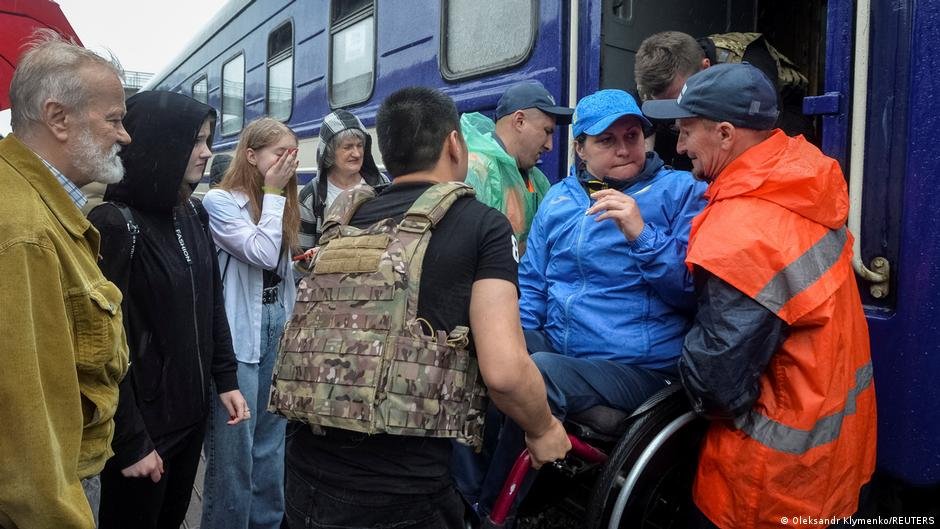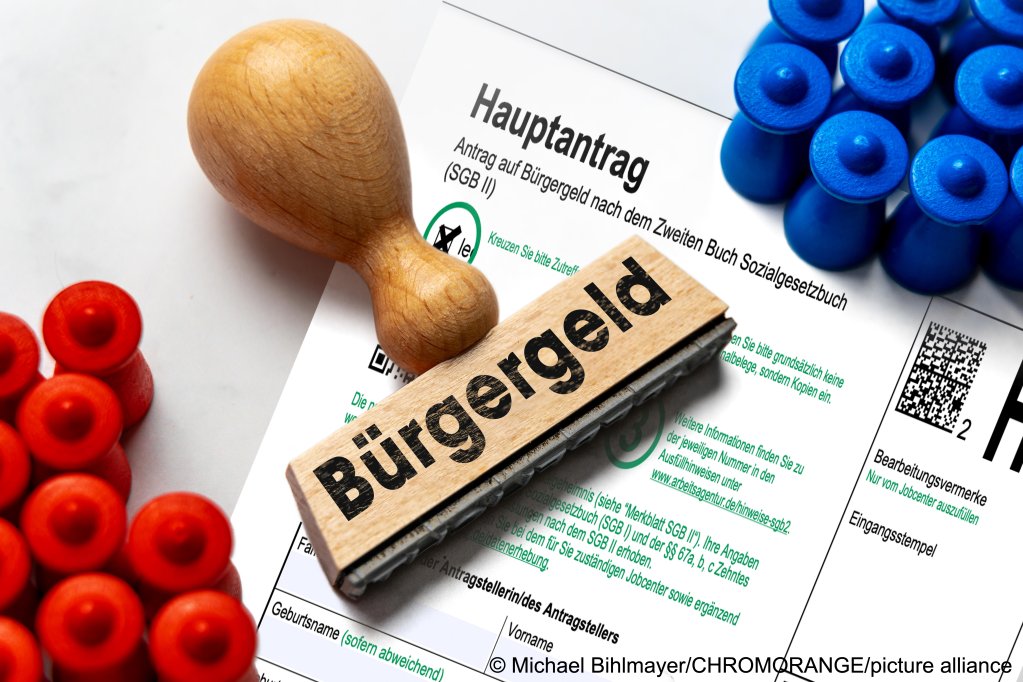The German government has announced plans to lower the amount of money that recently-arrived war refugees from Ukraine will get in future as part of the benefits they are entitled to. Some believe that the draft law doesn't go far enough, while others have crunched the numbers and believe that there won't be any money saved at the end of the day.
Ukrainian war refugees have been able to come to Germany for the past three years under the EU's Temporary Protection Directive, which was introduced in response to Russia's invasion of Ukraine in February 2022.
As part of this directive, they are able to directly claim certain welfare benefits, which normally are only accessible to German and EU nationals as well as long-term non-German residents of Germany who are unemployed.
This is known as Citizen's Allowance (Bürgergeld) in Germany, and Ukrainian nationals have been able to qualify for it upon arriving without undergoing anything that would resemble an asylum application process.
However, this special arrangement might be about to change: Under a draft bill, Ukrainians who have arrived in Germany since April 1, 2025 and those who plan to come to Germany in the future, will no longer be entitled to Bürgergeld but will instead receive benefits under the generic Asylum Seekers' Benefits Act.

Read AlsoTemporary protection status for Ukrainians extended until March 2027
Between asylum seeker and resident
Asylum seekers' benefits are lower by roughly 100 euros per person per month compared to Bürgergeld, and only successful asylum seekers who are recognized as in need of protection qualify for Bürgergeld if they remain unemployed.
Asylum seekers undergoing their asylum process also only receive emergency and necessary medical care, as opposed to people on Bürgergeld, who qualify for preventative and curative treatments as well.
Despite the nature of the planned changes, Ukrainian war refugees would not be reclassified as asylum seekers but would continue to be treated as confirmed refugees as per the EU's Temporary Protection Directive.
With roughly two thirds of all Ukrainian war refugees being long-term unemployed, the issue of figuring out how to best support this demographic has become an increasingly contentious political issue.

Savings only on paper
A total of about 1.25 million war refugees from Ukraine have been living in Germany since Russia's invasion of the country in February 2022, with more slowly adding to that tally.
Government figures show that in the second quarter of 2025, around 21,000 Ukrainians had entered the country for the first time.
If all these newcomers were to claim Bürgergeld, it could cost the government 10 million euros monthly — at a time when the ruling coalition is seeking to find new ways to make savings on welfare spending.
However, the Federal Office of Labor and Social Affairs meanwhile said it believes that since the administration of asylum-related benefits is far more involved than that of Bürgergeld, chiefly on account of being processed locally and not centrally, the bureaucracy involved in this change would practically cancel out the savings.
In total, about 12 percent of all unemployment-related benefits paid out in Germany in 2024 went to recipients who had come to Germany as Ukrainian war refugees.
Read AlsoUkrainian refugees in Germany: Why few work for a living
Right-wing coalition partners want more change
The premier of the state of Bavaria, Markus Söder, meanwhile went as far as calling for all Ukrainian refugees in Germany — not just the new arrivals — to be excluded from the higher rate of benefits that are granted under Bürgergeld provisions.
According to Söder's rationale, this could mean a fiscal savings of almost 1 billion euros annually, at least on paper.
Söder further reiterated in a television interview that "everyone who is able to work, should work," receiving support by the head of Chancellor Friedrich Merz's office, Thorsten Frei, who highlighted the fact that only one in three Ukrainians in Germany who are fit to work are currently in gainful employment.
Frei also criticized the fact that the rate of employed Ukrainian refugees in other EU nations was higher than it is in Germany. Politicians making this argument often point to countries like the Netherlands, where many more Ukrainiains entered the work force, perhaps because such high benefits to remain unemployed were not on offer.
Read AlsoUkrainian refugee aid across Europe compared
A young coalition on shaky grounds
However, it is unlikely that the majority of parliamentarians would follow the suggestions of the two conservative politicians, with Ukrainian refugees still largely enjoying wide support across Germany's public in general.
German Vice Chancellor Lars Klingbeil slammed Söder's calls, going as far as saying that his provocative suggestion could damage the cohesion of the coalition government, which both politicians' parties are part of.
"Some of the proposals that have been made in recent days do not, I believe, help us to make progress together in the coalition," said Klingbeil.
Furthermore, the agreement reached between the two coalition parties to form a government earlier this year had already specified that any change in the law would only affect those who arrived in Germany after April 1, 2025.

Labor market researcher Enzo Weber from the Berlin-based Institute for Employment Research (IAB) meanwhile told the dpa news agency that "the integration of refugees in the labor market requires time," stressing that this could be speeded up by improving on the long waiting times for language and integration courses for Ukrainians in Germany.
The KNA news agency cited numbers provided by the Federal Employment Agency, which stated that only 24,000 Ukrainian nationals were currently enrolled in employment-related language courses.
Read AlsoGermany: Bureaucracy blocks Ukrainian and Syrian doctors
No final decision before year-end
It is unclear at this point whether the government would retroactively want to claw back the difference of any welfare payments to Ukrainian nationals that were made prior to the eventual enactment of the law.
The draft law would have to be approved by the cabinet as well as the Bundesrat, Germany's upper house of parliament, which includes representatives from the Federal states, before it could come into effect.
Realistically, however, this would not happen before the end of the year.
Read AlsoRefugees and asylum seekers in Germany: Five things to know
With Reuters, dpa, KNA
